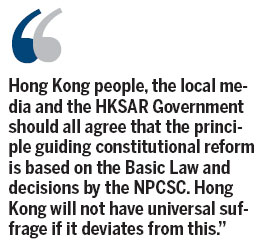Can political reforms succeed?
Updated: 2013-12-18 08:09
By Zhou Bajun(HK Edition)
|
|||||||
Hong Kong's political circumstances seem to have been dragged into the mire. Many observers are pessimistic about the ongoing public consultation on the arrangement for the Chief Executive (CE) election in 2017 and Legislative Council (LegCo) election in 2016 (simplified as two elections). However, others optimistically feel some compromise might eventually be reached - as occurred in June 2010.
Three and a half years ago, political reform on the two methods of the CE election and LegCo election in 2012 seemed to have failed. Then, in late June 2010, something dramatic happened. The so-called "dovish wing" of the opposition camp accepted a revised version of the reform package. Constitutional development in 2012 was unexpectedly rescued from a very difficult situation.
As Elsie Leung, the vice-chairwoman of the HKSAR Basic Law Committee (BLC) of the National People's Congress Standing Committee (NPCSC), helped reach the political compromise three and a half years ago, her recent comments on the two elections, particularly on CE universal suffrage, have attracted much attention.
On Dec 11, 2013, Leung discussed the two elections on a Commercial Radio Hong Kong program. The day after, on Dec 12, two local Chinese newspapers - Ming Pao and Hong Kong Economic Journal - described Leung's special role in Hong Kong's constitutional development. Both newspapers also noted Leung's role in the political U-turn of June 2010.
The Hong Kong Economic Journal said Leung was again playing a critical role in the current public consultation. Ming Pao noted that Leung had rejected the opposition's proposal of a "civil nomination" for CE candidates through universal suffrage. But it pointed out that Leung had also said that if "civil nomination" could show itself to be consistent with the Basic Law she would change her mind - without any concerns about her public reputation. The newspaper said in an editorial that Leung's comments might even hint to a repeat of the political drama of June 2010.

It's understandable that Hong Kong people desire universal suffrage. But a desire doesn't always equate to a reality. In history, transforming a desire into reality requires certain preconditions. And in Hong Kong today, only if some fundamental preconditions are met, can universal suffrage go from being a desire into part of HKSAR's constitutional system.
It is also understandable that the local media want universal suffrage. However, the media, in the public interest, should try to foster a healthy environment conducive to political compromise. To do this, the local media has to adhere to the Basic Law and the "One Country, Two Systems" principle. I understand this may be open to debate. Some sections of the media have been standing firmly with the opposition camp. They say their stance is consistent with the Basic Law and the "One Country, Two Systems" principle. Nevertheless, while focusing on "Hong Kong people rule Hong Kong", they forget that the HKSAR belongs to the People's Republic of China. One or two sections of the local media have gone too far. They have spared no efforts in defaming the central government and minimizing the mainland's achievements.
It is also understandable that the current HKSAR Government wants to carry out its obligations to implement universal suffrage during its current term in office. I admire the courage of the CE and his government in doing so. People make history and leadership plays a vital role. Democratizing Hong Kong is part of the HKSAR Government's mission, but returning it to the nation is also part of this. The HKSAR Government should pay particular attention to promoting patriotism. The CE and his secretaries' priority must be to reconcile the city's democratization by promoting a return to the country.
Hong Kong people, the local media and the HKSAR Government should all agree that the principle guiding constitutional reform is based on the Basic Law and decisions by the NPCSC. Hong Kong will not have universal suffrage if it deviates from this. The HKSAR is at the crossroads. Only by strictly adhering to the Basic Law and NPCSC's decisions, can Hong Kong overcome its future uncertainties.
The CE and his secretaries have to make an important choice. The idea of "Love the Nation, Love Hong Kong" should always be emphasized. On our way forward, we cannot take any short cuts, or hesitate.
The author is a veteran in current affairs commentary.
(HK Edition 12/18/2013 page1)